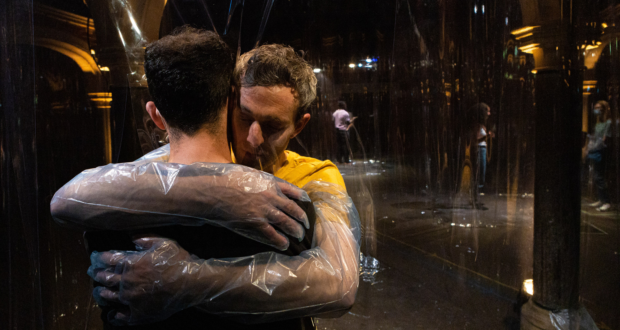An exhilarating, intelligent production, that movingly articulates the importance of touch between humans.Summary
Rating
Unmissable!
How do you describe something that is not there? How do we make contact without touching? During Covid restrictions many of us have been starved of human touch. We’ve become accustomed seeing people through glass now, be it a window, a Zoom screen, or a plastic sheet. This extraordinary piece of immersive theatre from Dante or Die identifies not only the barriers between people, but the vital invisible connections which remain present, and which we must relearn, post-pandemic.
At the venue I was stripped of my bag and it was locked away safely. Feeling strangely exposed without my worldly paraphernalia, I was allocated a spot to stand on alongside only two other participants. Each spectator must mask up and wear arm-length plastic gloves; oversized symbols of Covid restrictions that epitomise the social distancing we have endured. We are then launched one at a time along a labyrinthian trail, leading around the church-like venue. As each path laces its way through enormous, crystal-clear plastic sheets, it becomes obvious that they form cells within which three separate actors await each of us individually.
Referencing the ‘hug tunnels’ seen in care homes during the pandemic, which enabled people to hug their loved ones, the cells allow us to be separate from the actors but simultaneously close. I was strangely aware of the several interactions occurring as I became part of one myself. Although foregrounding the individual’s experience, the performance as a whole embraces you within the shared space of other lives and then literally breaks through the barriers that divide us.
These monologues can’t be performed without an audience member, and each piece demands some personal commitment. The compelling, affective actors not only deliver amazing scripts, but faultlessly use biological phenomena, such as intense eye contact, personal space, and verbal interaction to create an unexpected intimacy with them — a stranger. Consent is earned before the actual process of touching through plastic takes place. Themes of distance and closeness, absence and tangibility are united through performances that made me feel both unique and fabulously affirmed.
Each monologue is performed totally flawlessly. Ordinarily I might feel self-conscious in this kind of immersive experience, but the actors create a positive ambiance of commitment and security that enables the sharing of proximity and emotion, whilst haunting music by Yaniv Fridel & Ofer OJ Shabi seamlessly draws the diverse elements together.
Rachel-Leah Hosker in Our Hands by Ann Akinjirin, was my first one-on-one. Charming and engaging, our interaction caused me to focus intently on the use of hands, and her almost imperceivable micro-movements made it unbelievably intimate, yet still comfortable. In describing ideas of absence and lack, she creates a powerfully affirming and positive experience.
Performing The Sessions by Tim Crouch is Terry O’Donovan who, along with Daphna Attia, is also co-creator of the production. As a seemingly repentant (yet insidiously creepy) former abuser, O’Donovan’s delivery of this poetic writing is emotionally resonant: he was literally in tears at times. The use of touch in this scenario is unsettling and challenging, but extraordinarily compelling.
The final piece is Touch the Flesh from writer Sonia Hughes. In a remarkable performance, Oseloka Obi intertwines three characters. The interaction left me both moved and disorientated, at times drawn in to feel like a character myself, even when not being asked to actively participate.
I left the venue completely exhilarated, my brain analysing the intricacy of this intelligent production, stunned by its emotional impact and the talent of the cast. Immersive theatre doesn’t get any better than this. I would do it again in a heartbeat!
Created by: Daphna Attias & Terry O’Donovan
Monologues written by: Ann Akinjirin (Our Hands) Tim Crouch (The Sessions) Sonia Hughes (Touch The Flesh)
Directed by: Daphna Attias
Design by: Khadija Raza
Music & Sound Design by: Yaniv Fridel & Ofer OJ Shabi
Lighting Design by: Zia Bergin-Holly
Movement Direction by: Ayse Tashkiran
Produced by: Sophie Ignatieff for Dante Or Die
Skin Hunger is playing until 27 June. Currently all performances are sold out, but we recommend checking website for new dates or returns. Full details via the below link.
 Everything Theatre Reviews, interviews and news for theatre lovers, London and beyond
Everything Theatre Reviews, interviews and news for theatre lovers, London and beyond




2 comments
Pingback: Interview: Bringing passion in prison to the stage - Everything Theatre
Pingback: Interview: Bringing ardour in jail to the stage - fridaywebseries.com